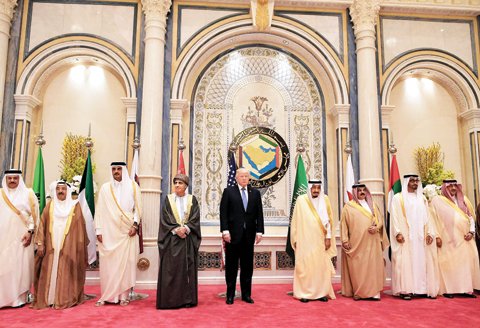Trump calls to isolate Iran, confront extremism
 Saudi King Salman bin Abdulaziz pose for a picture with Sheikh Sabah and other leaders of the Gulf Cooperation Council yesterday. - AFP
Saudi King Salman bin Abdulaziz pose for a picture with Sheikh Sabah and other leaders of the Gulf Cooperation Council yesterday. - AFPRIYADH: Saudi Arabia's King Salman yesterday accused regional rival Iran of exporting extremist Islamic movements to the world and vowed to eliminate the Islamic State group. "The Iranian regime has been the spearhead of global terrorism since the (Ayatollah Ruhollah) Khomeini revolution" in 1979, King Salman said in a speech to leaders including US President Donald Trump. "We did not know terrorism and extremism until the Khomeini revolution reared its head," he said. Saudi Arabia was also determined to "eliminate the Islamic State group", the king said.
In his highly anticipated speech in Saudi Arabia, Trump urged Islamic leaders to take a stand against violence done in the name of religion, describing the struggle against extremism as a "battle between good and evil". , Trump lashed out at Iran, accusing Tehran of fuelling "the fires of sectarian conflict and terror" and calling for its international isolation. Saying he came with "a message of friendship and hope and love", Trump told dozens of Muslim leaders that the time had come for "honestly confronting the crisis of Islamist extremism".
"This is a battle between barbaric criminals who seek to obliterate human life, and decent people of all religions who seek to protect it. This is a battle between good and evil." The speech came on the second day of a visit to Saudi Arabia, part of Trump's first foreign tour that will take him next to Israel and the Palestinian territories and then to Europe. The White House has sought to draw a clear distinction during the visit with Trump's predecessor Barack Obama, who Saudi Arabia and its Arab allies saw as lecturing and soft on their rival Iran.
Trump did not hesitate to single out Iran in his speech. "From Lebanon to Iraq to Yemen, Iran funds, arms and trains terrorists, militias and other extremist groups that spread destruction and chaos across the region," Trump said. "Until the Iranian regime is willing to be a partner for peace, all nations of conscience must work together to isolate it." He appealed to Muslim nations to ensure that "terrorists find no sanctuary on their soil" and announced an agreement with Gulf countries to fight financing for extremists.
Unlike the Obama administration which would often raise concerns over civil liberties with longstanding Arab allies, Trump had made no mention of human rights during his visit so far. "We are not here to lecture - we are not here to tell other people how to live... or how to worship. Instead, we are here to offer partnership - based on shared interests and values," Trump said.
Some 35 heads of state and government from Muslim-majority countries were in Riyadh for the Arab Islamic American Summit, mainly from states friendly to Saudi Arabia. Much of the focus during the summit was on countering what Gulf states see as the threat from Iran, which opposes Saudi Arabia in a range of regional conflicts from Syria to Yemen. Trump's speech was touted as a major event - along the lines of a landmark address to the Islamic world by Obama in Cairo in 2009.
Trump earlier held talks with leaders of the oil-rich Gulf monarchies, a day after Washington told their arch rival Iran to dismantle its "network of terrorism". Leaders of the Gulf Cooperation Council posed for a photo with Trump before they walked into their meeting. In the meeting, GCC leaders and Trump agreed on a memorandum of understanding to establish a center to combat the financing of terrorism, Saudi official news agency SPA reported. The GCC groups Saudi Arabia, Bahrain, Kuwait, Oman, Qatar and the United Arab Emirates, all of which are traditional allies of Washington.
Most GCC monarchies accuse Tehran of meddling in their internal affairs and want Washington to be tougher with Iran, which secured a landmark nuclear deal with world powers when Trump's predecessor Barack Obama was in office. They consider Tehran to be a destabilizing factor in the region. - Agencies










